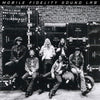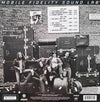





The Allman Brothers Band - At Fillmore East (2LP, Ultra Analog, Half-speed Mastering)
ORDER LIMITED TO ONE ITEM PER CUSTOMER
Gregg Allman – organ, piano, vocals [click here to see more vinyl featuring Gregg Allman]
Duane Allman – lead guitar, slide guitar
Dickey Betts – lead guitar
Berry Oakley – bass guitar
Jai Johanny Johanson – drums, congas, timbales
Butch Trucks – drums, timpani
Jim Santi – tambourine
Thom Doucette – harmonica (A2-3, B1)
Bobby Caldwell – percussion (C2)
Rudolph ("Juici") Carter – soprano saxophone (C2)
Written by Will Greg Allman (C1, D1), McTell (A1), Clarence Lewis (A2), David C. Thomas (A2), Elmore James (A2), Morgan Robinson (A2), T.Bone Walker (A3), Willie Cobbs (B1), Berry Oakley (C1), Butch Trucks (C1), Dickey Betts (C1-2), Duane Allman (C1), Jai Johanny Johanson (C1)
2 LPs, gatefold sleeve
Limited numbered edition
Original analog Master tape : YES
Half-speed Mastering
Gain 2™ Ultra Analog
Speed : 33RPM
Heavy Press : 180g
Record color : black
Size : 12”
Stereo
Live
Record Press : RTI
Label : MOFI
Original Label : Capricorn Records
Recorded live March 12–13, 1971 at Fillmore East, New York City
Engineered by Aaron Baron, Larry Dahlstrom
Produced by Tom Dowd
Remastered by Krieg Wunderlich at Mobile Fidelity Sound Lab, Sebastopol, CA
Originally released in 1971
Reissued in 2015
Tracks:
Side A :
Statesboro Blues
Done Somebody Wrong
Stormy Monday
Side B :
You Don't Love Me
Side C :
Hot 'Lanta
In Memory Of Elizabeth Reed
Side D :
Whipping Post
Awards :
Rolling Stone 500 Greatest Albums of All Time - Rated 105/500!
Rolling Stone 500 Greatest Songs of All Time - "Whipping Post" - Rated 393/500!
Rolling Stone 2015 Readers' Poll: The 10 Best Jam Bands: The Allman Brothers Rated 2nd!
1000 Recordings You Must Hear Before You Die - Ranked 214
Reviews :
"Whereas most great live rock albums are about energy, At Fillmore East is like a great live jazz session, where the pleasure comes from the musicians' interaction and playing. The great thing about that is, the original album that brought the Allmans so much acclaim is as notable for its clever studio editing as it is for its performances. Producer Tom Dowd skillfully trimmed some of the performances down to relatively concise running time (edits later restored on the double-disc set The Fillmore Concerts), at times condensing several performances into one track. Far from being a sacrilege, this tactic helps present the Allmans in their best light, since even if the music isn't necessarily concise (three tracks run over ten minutes, with two in the 20-minute range), it does showcase the group's terrific instrumental interplay, letting each member (but particularly guitarist Duane and keyboardist/vocalist Gregg) shine. Even after the release of the unedited concerts, this original double album remains the pinnacle of the Allmans and Southern rock at its most elastic, bluesy, and jazzy." AllMusic Review by Stephen Thomas Erlewine
"Although this double album is unbeatable testimony to the Allman Brothers' improvisational skills, it is also evidence of how they connected with the crowds at New York's Fillmore East, and how the reciprocal energy gave birth to rock's greatest live double LP. "The audience would kind of play along with us," singer-organist Gregg Allman said of those March 1971 shows. "They were right on top of every single vibration coming from the stage." The guitar team of Duane Allman and Dickey Betts was at its hair-raising peak, fusing blues and jazz with emphatic force in "Whipping Post" and "In Memory of Elizabeth Reed." But their telepathy was cut short just three months after the album's release, when Duane died in a motorcycle accident." - www.rollingstone.com
Ultra Analog™ : The GAIN 2 Ultra Analog™ Series stems from the use of the Gain 2 system, mastered at half speed from the original master tapes where possible, capturing and uncovering as before undiscovered sonic information.
Half-speed mastering. In half-speed mastering, the whole process is slowed down to half of the original speed. A typical 33 1/3 rpm record is cut at 16 2/3 rpm. The source material is also slowed down (reducing the pitch in the process) meaning the final record will still sound normal when played back. Slowing the whole process down allows more time, which means the end result sounds better and is more efficient — allowing engineering to minimize the effects of inherent limitations within the vinyl format. The result is a more accurate and more open high-frequency response in the half speed vinyl when compared with a normal speed recording.
Ratings :
AllMusic : 5 / 5 , Discogs : 4,55 / 5

